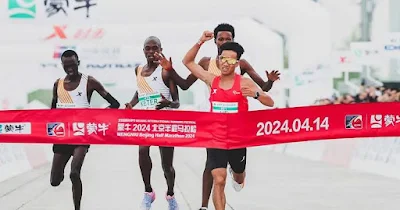Willy Mnangat, one of the runners involved in the Mengniu Beijing Half Marathon controversy, insists he was a pacemaker in the race despite suggestions he entered as a runner.
Kenyans Mnangat and Robert Keter, and Ethiopia’s Dejene Hailu Bikila found themselves in the middle of a social media storm on Monday, with footage of the end of Sunday’s race showing them slowing down to let China’s He Jie win.
In videos of the incident, Mnangat can be seen looking at Asian Games marathon gold medallist He and pointing forward as the four runners approach the finish line.
Mnangat also made a waving gesture, beckoning He to go ahead. The Chinese runner passed the trio and they made no effort to respond.
On Monday, Mnangat told the Post he let the Chinese athlete pass him “because he is my friend”.
But six hours later, Mnangat claimed he and three others were hired as pacemakers to help He break the Chinese half-marathon record of one hour two minutes 33 seconds. The winning time was 1:03:44.
“I was the pacemaker, my boss told me to come and pace so He could break the Chinese national record” Mnangat said. “My agent from Kenya told me, when I was going to get the visa, that I am going to China to help the Chinese break the national record.”
However, despite repeated requests, Mnangat has been unable to prove he was hired as a pacer and was not taking part as a competitor.
The Post has been unable to contact Bikila and Keter, but did reach one of Mnangat’s agents, a Chinese man named Karen Lin, who represents 29 runners from Kenya.
In a brief conversation, Lin said it had “nothing to do with me” and accused the Post of harassment.
An official document from the event showing the race result has Bikila, Keter and Mnangat in second, third and fourth, respectively. All three are listed as athletes.
On April 8, the marathon’s organiser released a list of the official pacemakers, and Mnangat, Keter and Bikila were not among those named. All were Chinese and were tasked with keeping the pace for 130 minutes to 310 minutes.
No pacemakers were listed for a sub-two-hour finish. In last year’s Beijing Marathon, elite runners were hired as pacers, but wore bibs identifying them as such.
The website also showed that pacemakers would be given clothes that said “Pacer” on the front and back from the sponsor Xtep, for which He is a contracted spokesman.
Shares in Xtep International Holdings, which is listed on the Hong Kong stock exchange, dropped 7 per cent after the marathon ended.
It is common in China for agents to pay the fees and handle the administration for elite runners from Africa to compete in marathons and take a cut of the prize money.
But there have been instances where the runners do not receive the cash from the agents or have to wait for months before finally being paid.
“We are investigating and will announce the results to the public once they are available,” a person from the Beijing Sports Bureau, who wished to remain anonymous, told Agence France-Presse.
The event’s organiser – the Beijing Sports Competition Management and International Exchange Center – also said an investigation had been launched.

